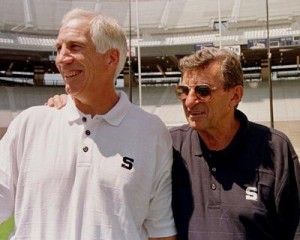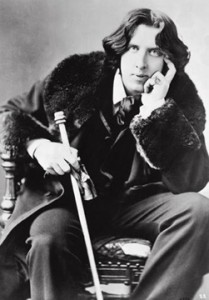I woke up to the news of the death of Penn State football coach Joe Paterno this morning, after an apparently short bout with lung cancer. The announcement – predictably given the news of the past few months – touched off a firestorm of commentary in the media, sports and otherwise, via obituaries, columns and Twitter.
The lead of the New York Times official obit of Paterno got it just about right but caused an outcry from the record-setting coach’s staunchest defenders regarding the inclusion of the sexual abuse controversy that brought an abrupt end to his coaching career in November. Meanwhile, others decried simple mentions of “RIP” on Twitter and Facebook as too much of a wish for a man whose inaction likely resulted in the continuing molestation of young boys by his former defensive coordinator Jerry Sandusky.
When the Sandusky-Penn State story broke in November, I got wrapped up in it more than any “media firestorm” in recent memory. Perhaps it was the explosion of such an apparently huge and deplorable series of crimes committed (both legal and moral) by individuals who had previously built a nearly impeccable record of leadership and accomplishment. To say that Penn State was seen as a beacon of all that was “right” with the world of collegiate athletics prior to this scandal would be a massive understatement.
Watching what happened to the legacy of a man like Paterno in the passing weeks – as he essentially slipped away – was stunning and sad to someone who values the positives that sports can bring to a life. But to say anyone brought this end upon Paterno other than himself would be far from true.
There’s that word – true. Isn’t truth what this story is really all about? What was really true? How can two things at such distant ends of a spectrum of right and wrong about one person essentially both be true? It’s really appropriate, then, that I am reading a fantastic book called “The Night of the Gun” by New York Times columnist David Carr. In the book, Carr – a former drug and alcohol addict who nearly saw his life slip away – uses his vast investigative journalism skills to basically tell the story of his own life, via interviews with those close to him during different parts of it, as well as documents and other tidbits that help him put together a story that will be closest to the “truth” about his life.
Carr often opens chapters with quotes from famous writers that have some sort of relevance to the upcoming information. One of those quotes couldn’t be more fitting to the story of Paterno and how different people are reacting to the news of his death:
“The truth is rarely pure and never simple.” – Oscar Wilde
Indeed.
Truth: Paterno won 409 games, more than any other NCAA Division I football coach.
Truth: Paterno’s success on the field and his commitment to improving the educational capabilities of Penn State are the two biggest reasons the school has become what it is today – a rare highly-regarded state school in a part of the country (the Northeast) where state schools are usually given short shrift.
Truth: Paterno turned out a series of exceptional graduates in his 46 seasons as head coach, both on and off the field.
Truth: Paterno was a family man, loyal to his wife Sue, his five children and numerous grandchildren. Sue and all five of his kids attended Penn State.
Truth: Paterno maintained an everyman image in secluded Happy Valley, making him both a larger-than-life hero as well as just a friendly “average Joe” (pardon the pun) to those closest to him – both in the community and in the local media.
However …
Truth: Grand jury testimony given in the investigation of a 2002 incident involving Sandusky and a boy in the Penn State locker room showed Paterno’s efforts to seek out the truth and protect those most innocent among us (children) woefully and shockingly lacking from a moral, if not necessarily a legal, standpoint.
Truth: Paterno held so much power in State College that it’s essentially accepted that he laughed off the president of the university and athletic director when they tried to force him to retire in 2004, following a series of poor seasons.
Truth: That overwhelming power vacuum in remote, sheltered Happy Valley and his lack of action in the 2002 Sandusky incident must call into question Paterno’s knowledge and action during the Penn State police’s prior investigation of Sandusky in 1998 and Sandusky’s then supposed “retirement” following the 1999 season. How could a man with the power Paterno wielded in State College NOT have known about the Penn State police investigation of a man who’d been a key part of his staff for more than two decades? And just why did Sandusky “retire” in 1999, when all indications had been that he was the heir apparent to Paterno?
Truth: Paterno was hounded by rumors of improper intervention when Penn State players found themselves either in legal or scholastic trouble in recent seasons since the Sandusky investigation came to light. In the past, most would have written those rumors off as the bitter recriminations of those who may have felt “wronged” by Paterno or Penn State. Now?
So what is the ultimate truth of the story of Joe Paterno? His many great qualities, his incredible commitment to education, his loyalty to Penn State, his concept of what he called “the Grand Experiment” – success with honor – and how he and generations of Penn State players lived up to it … are those things enough to overcome the indubitably horrific choices he made in the Sandusky matter? Where is the balance? What truth wins out?
Of all the things I read about Paterno’s death today, this piece by Gregg Doyel of CBSSports.com – one of Paterno and Penn State’s most outspoken critics since November – really hit home. Joe Paterno was a man. He was not the god many Penn State fans – many football fans – seemed to idolize him as. Nor is he the personification of evil that many people – people who are understandably angered by his lack of moral action and leadership in perhaps the greatest test of his life – would believe.
He was as fallible as you or me. He was as fallible as a writer like Carr, whose self-investigation hits home with me. Trust me, after the past couple years of my own life, I know what it’s like to feel fallible, to wish you’d done more, to suffer from guilt – but also to understand that those things aren’t the complete truth of your own life. Carr finds in his book that he is, in fact, a drug dealer, a drug addict, a general fuck-up. But he also finds that he is a committed father, a spectacular investigator, an excellent writer. All of those truths are a part of Carr the man.
And … all of the truths you have read about Paterno are part of him. You can laud Paterno for the massive achievements for the bulk of his life, while also maintaining high levels of anger, shocked disbelief and a complete loss of respect for this one massive mistake that will (and should) color his legacy forever. Mostly, today, you can mourn for his family and friends at their loss, while also mourning for the children whose lives were likely irreparably harmed by his inaction.
“The truth is rarely pure and never simple.” And there are few things truer than that.


